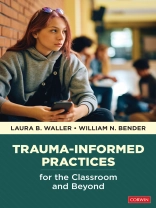Find the right strategies and tools to support students who experience trauma
Studies show that 46-75% of children experience trauma, often resulting in challenging behavior, depression, and anxiety as well as long-term physical and mental health issues. Today’s educators, counselors, and clinicians need the right strategies to help.
Written by experts with years of experience working with children and teens exposed to adverse childhood experiences (ACEs), Trauma-Informed Practices for the Classroom and Beyond describes the most effective tools available and walks you through how to implement them with compassion and fidelity. Inside, you’ll find
- Detailed and easy-to-implement interventions that alleviate the effects of trauma, including mindfulness, journaling, restorative justice, and more
- Trauma-informed practices to use with all students, regardless of their age or the duration or frequency of their trauma exposure
- Ways educators can prepare their classrooms and schools to support students who experience ACEs
This how-to guide and its companion website with discussion points, recommended videos, and additional resources equips you with evidence-based techniques and instructions to support children and teens with ACEs and enhances your practice to better serve the students who need our help most.
Tabla de materias
Introduction
Chapter 1: Childhood and Teen Trauma
Chapter 2: Classroom Basics for Students Exposed to Trauma
Chapter 3: Defusing Explosive Behavioral Outbursts
Chapter 4: Sensory Support in the Classroom
Chapter 5: Social-Emotional Learning
Chapter 6: Mindfulness and Relaxation Strategies
Chapter 7: Journaling for Students Exposed to Trauma
Chapter 8: Emotional Support Animals in the Classroom
Chapter 9: Mentoring Students Exposed to Trauma
Chapter 10: Service Learning: Helping Others to Heal Oneself
Chapter 11: Restorative Justice
Epilogue: Bringing This All Together
Sobre el autor
William N. Bender, Ph D, has had a long and distinguished career in education, teaching in public school for several years and in higher education for some 26 years at Blue?eld State College in West Virginia, Rutgers University in New Jersey, and the University of Georgia. He has written 36 books in special and general education. With his retirement, he has stepped back from his rigorous workshop schedule, which as recently as 2016 included some 40 workshop days per year. While the COVID-19 pandemic impacted his work, he has written four historical ?ction novels and several educational books in recent years. He has delivered several professional development projects, including most recently a keynote for a virtual conference on project-based learning in Brazil in conjunction with his Corwin book Project-Based Learning (2012).Learn more about William Bender′s PD offerings Consulting Description: Differentiated Instruction Consulting Description: Math Consulting Description: Project-Based Learning Consulting Description: RTIConsulting Description: Technology












